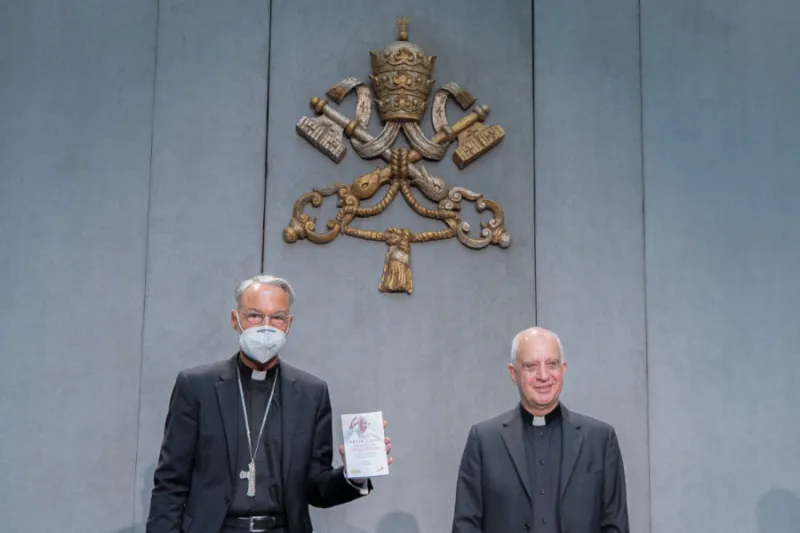
What is the new ministry of catechist? A CNA explainer
 Bishop Franz-Peter Tebartz-van Elst and Archbishop Rino Fisichella present the apostolic letter ‘Antiquum ministerium’ at the Vatican, May 11, 2021. / Vatican Media.
Bishop Franz-Peter Tebartz-van Elst and Archbishop Rino Fisichella present the apostolic letter ‘Antiquum ministerium’ at the Vatican, May 11, 2021. / Vatican Media.
Vatican City, May 11, 2021 / 08:00 am (CNA).
Pope Francis on Tuesday instituted the new lay ministry of catechist, with the apostolic letter Antiquum ministerium (“Ancient ministry”).
You might have questions about what this ministry is and who it is for. In this explainer, CNA answers your burning questions about this new (or is it?) ministry in the Church.
What is the instituted ministry of catechist?
An instituted ministry is a type of formal, vocational service within the Catholic Church. It can be either lay, such as lector or acolyte, or ordained, such as deacon or priest.
The newly instituted ministry of catechist is for lay people who have a particular call to serve the Catholic Church as a teacher of the faith.
The ministry is “stable,” meaning it lasts for the entirety of life, independent of whether the person is actively carrying out that activity during every part of his or her life.
But catechists already exist. How is this different?
Many catechists today serve the Church at the parish level, but the instituted ministry of catechist will be tied to the diocese and be at the disposal of the diocesan bishop.
Archbishop Rino Fisichella explained at a Vatican press conference May 11 that “the institution of a ministry by the Church is confirmation that the person invested with that charism is performing an authentic ecclesial service to the community.”
Fisichella is president of the Pontifical Council for the Promotion of the New Evangelization, which oversees the Church’s instituted ministries.
The institution of this ministry, together with the lay ministries of lector and acolyte, “will make it possible to have a laity that is better prepared in the transmission of the faith,” the archbishop said.
He also emphasized that the instituted catechist is dedicated to the transmission of the faith through proclamation and instruction — he or she does not have any kind of liturgical responsibility.
The catechist collaborates with the local bishop and priests in the teaching of the faith to the local community. And it can be a benefit in places where priests are scarce.
Pope Francis “is well aware of how many areas of Latin America and Africa today still have catechists at the head of the community,” Fisichella said. He stressed the unique nature of each ministry, noting that they are not interchangeable.
“At stake here is much of what is new in this ministry,” he said. “Men and women are called to express their baptismal vocation in the best possible way, not as substitutes for priests or consecrated persons, but as authentic laymen and laywomen who, in the distinctive nature of their ministry, are able to experience the full of extent of their baptismal vocation of witness and effective service in the community and the world.”
Who is qualified to be instituted into the ministry of catechist?
Pope Francis’ letter said that a lay person called to be instituted in the ministry of catechist should have “deep faith and human maturity,” be an active participant in the life of the Christian community, and “capable of welcoming others, being generous and living a life of fraternal communion.”
Bishops’ conferences will be responsible for deciding the “necessary process of formation and the normative criteria for admission” to the new ministry.
Individual bishops are tasked with determining appropriate candidates in their own territories, and ensuring they have been properly prepared through “suitable biblical, theological, pastoral and pedagogical formation.”
Prior experience of catechesis is also a prerequisite.
Archbishop Fisichella said that “it is obvious that not everyone who is a catechist today will have access to the ministry of Catechist.”
“Of primary importance is the vocational dimension which implies a willingness to serve the Church where the bishop considers it most beneficial,” he explained. “Ministries are not conferred for personal gratification, but for service to be rendered to the local Church where the bishop deems the presence of the catechist necessary.”
The Vatican Congregation for Divine Worship and the Discipline of the Sacraments will publish a Rite of Institution of the new lay ministry of catechist. It will be ready “in a short time,” according to Fisichella.
Where did the idea of the lay catechist come from?
In his apostolic letter, Pope Francis emphasized the history of the catechist, beginning with the New Testament’s First Epistle to the Corinthians, which refers to “teachers” within the early Christian community.
He said that catechists played a critical role in the Church’s missionary expansion in the following centuries and noted the renewed appreciation for lay catechists in the work of evangelization following the Second Vatican Council.
Fisichella said his pontifical council, at the request of Pope Francis, has been studying the institution of the lay ministry of catechist for more than five years in collaboration with bishops’ conferences and experts.


